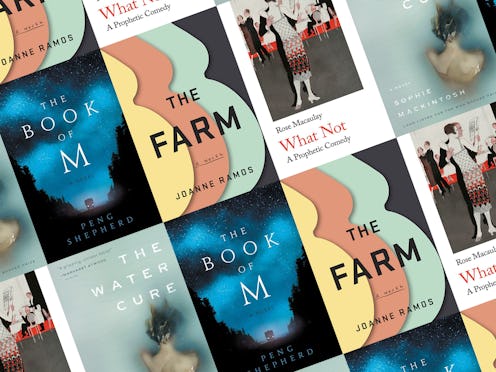Books
It's No Surprise That Female-Centered Dystopian Novels Are So Popular — Here's 5 To Read

From The Handmaid’s Tale to Parable of the Sower, Before She Sleeps to Vox, female-centered dystopian fiction has been giving voice to women’s greatest rage — and deepest fears — for decades. But while the genre has been in print for generations (Rose Macaulay's What Not, for example, was published a century ago), the mass appeal of feminist dystopian fiction is relatively new. Once a niche genre, the last two years alone have seen the publication of dozens of titles: Louise Erdrich’s The Future Home of the Living God, Leni Zumas’ Red Clocks, Naomi Alderman's The Power, Jennie Melamed's Gather the Daughters… and more. And although the genre may be fiction, the issues that feminist dystopias explore are all too real.
Issues like misogyny, tyranny, violence against women, limited reproductive rights, restricted access to education, loss of autonomy, environmental devastation (which disproportionately affects women, globally), and others. While the world might not have taken quite as extreme a turn as, say, Gilead, it certainly echoes the institutionalized sexism of Atwood’s Republic.
It’s no coincidence that these books have appeared in greater numbers — and garnered increasing readership — during the first two years of the Trump presidency, following the Women’s March and the eruption of the #MeToo movement. Perhaps we find comfort in visualizing our darkest futures, so that we may not become them. To that end, here are five feminist dystopian novels for your TBR pile this year. Under his eye, readers.
'The Testaments' by Margaret Atwood
The long (seriously, decades long) awaited and disturbingly timely sequel to Margaret Atwood’s best selling 1985 dystopian novel, The Handmaid’s Tale, The Testaments is set 15 years after Offred’s concluding scene in the original text, and will be narrated by three female characters. In the press release for The Testaments, shared with readers in November of last year, Atwood herself said that the inspirations for the sequel were her readers’ lingering questions about Gilead as well as global current events. Suffice it to say, I don’t expect readers will be disappointed by this one in the least. The only question now is, will The Testaments factor into the Hulu series as well? Get your pre-orders in order, 'cause this one will be ready for the top of your TBR in September.
'The Farm' by Joanne Ramos
A novel that is both an immigrant story and a work of feminist dystopian fiction, The Farm, by debut author Joanne Ramos, centers around a Filipina immigrant named Jane and a seemingly-idyllic Hudson Valley retreat center. But what, from the outside, might look luxurious is really a factory-farm-style maternity home — one in which women (aka: "Hosts") are monitored 24/7, isolated from the outside world, and forced to abandon everything from their former lives, all in pursuit of growing “perfect” babies. Look out for this one in May.
'What Not' by Rose Macaulay
First published in 1919 — and totally under appreciated in its time — What Not by Rose Macaulay is considered the original, feminist Brave New World. And 1984, for that matter. And, as it turns out, both Huxley and Orwell pulled inspiration from Macaulay’s little-read novel when writing their own works. Nothing says feminist dystopia like men taking credit for the work of a woman. Fortunately, Macaulay’s novel is getting a second chance at totally rocking the literary world, when it’s reissued this March. What Not tells the story of post-World War I eugenics and dangerous propaganda, complete with a government Ministry of Brains.
'The Water Cure' by Sophie Mackintosh
Out this month, The Water Cure by Sophie Mackintosh transports readers to a remote island off the coast of an unnamed and wasted continent. Far away from the pollution, poison, and (literal) toxicity of the patriarchy, three daughters have been hidden away from the world. Forced, by their mother, to perform bizarre and dangerous rituals designed to protect them from the ever-approaching dangers of the world, the sisters’ lives are upended when three men — the only men they’ve ever seen, other than their father — arrive on their shore.
'The Book of M' by Peng Shepherd
Filled with echoes of The Giver, The Book of M transports readers to a near-future world shaken by a disaster — one in which people’s shadows begin to disappear, and with them, their memories. It’s called The Forgetting: a plague-like phenomenon that affords it’s victims strange, new powers, but at the cost of forgetting everything — and everyone — from their past. One couple, Ory and Max, have been on the run from The Forgetting, until the day Max’s shadow disappears, and with it, so does Max. Her disappearance sends Ory on a journey through a dismantled world, desperate not only to find the love of his life, but to seek answers for the future ahead.